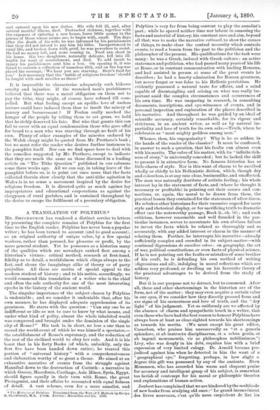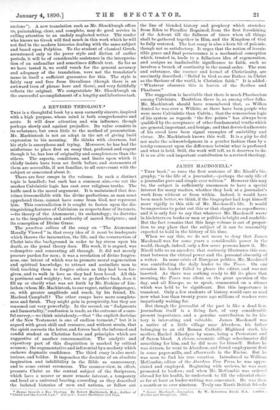A TRANSLATION OF POLYBITTS.*
Ma. SHUCKBURGH has rendered a distinct service to letters by presenting the complete remains of Polybius for the first time to the English reader. Polybius has never been a popular writer ; he has been turned to account (and to good account), as an original authority of unique value, by a few special workers, rather than perused, for pleasure or profit, by the more general student. Yet he possesses as a historian many of the qualities which are nowadays ranked first among a historian's virtues : critical method, research at first-hand, fidelity as to detail, a truthfulness which clings always to the fact, and shuns the imaginings alike of theory or of party prejudice. All these are merits of special appeal to the modern student of history ; and to his notice, accordingly, we would commend this translation of a writer who is the chief and often the sole authority for one of the most interesting epochs in the history of the ancient world.
The singular importance of the subject chosen by Polybius is undeniable ; and we consider it undeniable that, after his own manner, he has displayed adequate apprehension of its greatness. He starts with the question : " Can any one be so indifferent or idle as not to care to know by what means, and under what kind of polity, almost the whole inhabited world was conquered and brought under the dominion of the single city of Rome ?" His task is, in short, no less a one than to record the world-event of which he was himself a spectator,— the establishment of Rome's supremacy, and the reduction of the rest of the civilised world to obey her rule. And it is his boast that in his forty Books (of which, unluckily, only the first five have been handed down entire), he treated this portion of " universal history " with a. comprehensiveness and elaboration worthy of so great a theme. He aimed at an exhaustive narrative of events from the struggle against Hannibal down to the destruction of Corinth : a narrative in which Greece, Macedonia, Carthage, Asia. Minor, Syria, Egypt, should figure equally in their turn with Rome, the great Protagonist, and their affairs be recounted with equal fulness of detail. A vast scheme, even for a mere annalist, and
• The Hiztorics of Polybius. Translated from the Text of F. Hulls& by Evelyn 8. Sbackburgh, M.A. 2 yob. London : Macmillan and Co. 1839.
Polybius is very far from being content to play the annalist's part ; while he spared neither time nor labour in amassing the facts and material of history, his constant care and aim, beyond all that, was to make the narrative rational, to show the causes of things, to make clear the central necessity which controls events, to read a lesson from the past to the politician and the philosopher of the present. His qualifications for the task were many : he was a Greek, imbued with Greek culture ; an active statesman and politician, who had passed many years of his life at Rome, or in constant communication with leading Romans, and had assisted in person at some of the great events he describes ; he had a hearty admiration for Roman greatness, but never forgot or was false to his Hellenic patriotism. He evidently possessed a natural taste for affairs, and a mind capable of disentangling and seizing on what was really im- portant amid the complex circumstances and occurrences of his own time. He was unsparing in. research, in consulting documents, inscriptions, and eye-witnesses of events, and in personal inspection and exploration of the places described in his narrative. And throughout he was guided by an ideal of scientific accuracy, certainly remarkable, for its rigour and strictness, in an ancient writer, as well as by natural im- partiality and love of truth for its own sake,—Truth, whom he celebrates as " most mighty goddess among men."
Whence, then, his unpopularity? Why is he so seldom in the hands of the reader of the classics ? It must be confessed, in answer to such a question, that his faults ran almost even with his merits. The value of his matter, with its " infinite rich- ness of story," is universally conceded ; but he lacked the skill to present it in attractive form. No famous historian has so little charm of style. Nor is this want of charm to be ascribed wholly or chiefly to his Hellenistic diction, which, though dry and colourless, is at any rate clear, businesslike, and unaffected. The man was naturally destitute of artistic feeling ; his whole interest lay in the statement of facts, and (where he thought it necessary or profitable) in pointing out their causes and con- nections, or. again, the moral to be drawn from them, the practical lesson they contained for the statesman of after-times. He rebukes other historians for their excessive regard for mere style and rhetorical display, or for sacrificing truth to dramatic effect (see the noteworthy passage, Book ii., ch. 56) ; and such criticism, however reasonable and well founded in the par- ticular instances, serves to accentuate his own obvious failure to invest the facts which he related so thoroughly and so accurately, with any added interest or charm in the manner of relating them. Further, he interrupts his narrative—already sufficiently complex and crowded in its subject-matter—with continual digressions de omnibus rebus : on geography, the art of war, political constitutions, or even facts of physical science. If he is not pointing out the faults or mistakes of some brother of his craft, he is defending his own method of writing (digressions and all), indulging in moral reflections which are seldom very profound, or dwelling on his favourite theory of the practical advantages to be derived from the study of history.
But. it is our purpose not to detract, but to commend. After all, these and other shortcomings in the historian are of the form, not of the matter ; they may even acquire a certain value in our eyes, if we consider how they directly proceed from and are signs of his earnestness and love of truth, and the " dry light" of his judgment. Yet so uniformly are we affected by the absence of charm and sympathetic touch in a writer, that even those who have had the best reason to honour Polybius have always been at least as clear-sighted towards his shortcomings as towards his merits. (We must except his great editor, Casaubon, who praises him unreservedly as " et a generis splendore, et ab instructu disciplinarum, et a rebus gestis, et ab ingenii monumentis, vir as philosophus nobilissimus.") Livy, who was deeply in his debt, requites him with a brief expression of very limited eulogy. Dr. Arnold became pre- judiced against him when he detected in him the want of a " geographical eye," forgetting, perhaps, in how slight a degree this gift was possessed by any of the ancients. Even Mommsen, who has accorded him warm and eloquent praise for accuracy and intelligent grasp of his subject, is somewhat too lavish of contempt for his moral or philosophic theories and explanations of human action.
Jonbert has complained that we are hindered by the multitude of new books from studying old ones (" Le grand inconvenient des livres nouveaux, c'est gulls nous empechent de lire les
anciens "). A new translation such as Mr. Shuckburgh offers us, painstaking, clear, and complete, may do good service in calling attention to an unduly neglected writer. The reader who knows no Greek will find much in this work which he will not find in the modern histories dealing with the same subject and based upon Polybius. To the student of classical Greek, accustomed only to the purer style and diction of earlier periods, it will be of considerable assistance in the interpreta- tion of an unfamiliar and sometimes difficult text. So far as we have tested it, we could vouch for the general accuracy and adequacy of the translation, were not the translator's name in itself a sufficient guarantee for this. The style is fairly easy and free from literalisms (though there is an awkward turn of phrase here and there), and very faithfully reflects the original. We congratulate Mr. Shuckburgh on the successful accomplishment of a lengthy and laborious task.















































 Previous page
Previous page